Whisky sour: The Johnnie Walker closure 10 years on
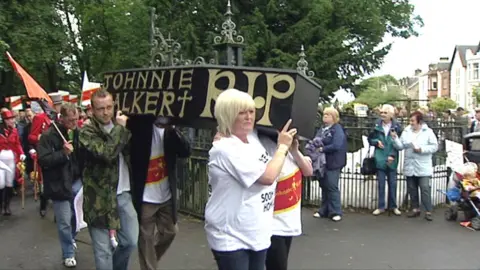 BBC
BBC"It was horrible. You felt sick," recalls Ronnie Rankin, of the mass staff meetings at the Johnnie Walker plant in Kilmarnock on 1 July 2009.
"You couldn't wait to get out of there that morning."
The plan had been kept from all but the most senior managers at Diageo. Those making the announcement did not know if they would keep their jobs.
Kevan Knox was a team leader on the bottling line. "I'd been there 35 years at the time, and my wife for 36 years, and it really was a concern for us, because both of us were losing our jobs potentially. How would we manage with mortgages and cars?"
Alex Rae worked in spirits supply and blending. "I thought I'd be there until I retired, because that's how sound it was. The day it was announced, it was out the blue - a bolt of lightning."
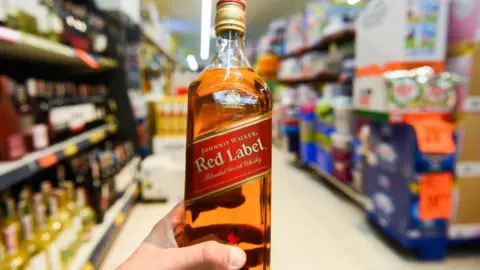 Getty Images
Getty ImagesThe announcement - 10 years ago today - came out the blue for the Scottish government as well. First Minister Alex Salmond was furious, and took part in a march of 20,000 people through Kilmarnock, pledging "we're not going to walk away". Nor was he going to let the plant's owner, Diageo, walk away.
Yet it did. More than 700 jobs went when the plant was finally wound down and closed in 2012. Production moved to Shieldhall, at Braehead on the west side of Glasgow, and to Leven in Fife.
Ten years on, Johnnie Walker is striding on stronger than ever. A consultancy, Brand Planet, named it as the 25th most valuable brand in Britain in 2018, worth £3.6bn - the world's biggest whisky brand, the biggest commercial brand in Scotland, and more valuable than Rolls-Royce, Jaguar, Morrison's and Marks and Spencer.
But in its home town, there is nothing left of that red brick plant. On a 10-acre site overlooking Kilmarnock station and the town centre, a large modern building is now home to Ayrshire College.
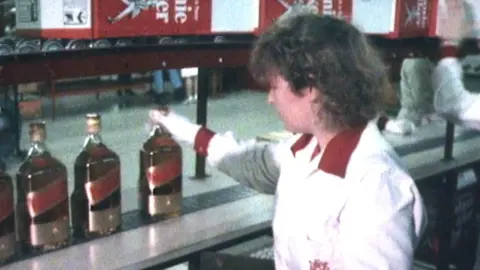
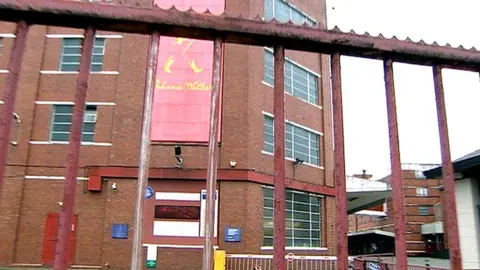
On the remaining 23 acres, there is only the pulverised remains of the brick and concrete.
This summer, diggers move in to start on the Halo Regeneration Project. It has a budget of £65m. Its executive chairwoman, Marie Macklin, who grew up near the plant, talks of 1,500 jobs and £100m of added value to the Scottish economy.
"This will give our town the belief that they can change the world, the same way that Johnnie Walker did," she told me. "We're at the forefront now of the next industrial revolution".
The first building will be an innovation hub for start-up companies and some that have already made a start. Marie Macklin is an investor in such firms.
To the west, there will be "live-work" units - an innovative idea that harks back to the days when artisans lived above the workshop.
Demanding role
Ms Macklin says that start-up entrepreneurs go through an intense phase where they might as well be next to their workplace because it's such a demanding and engrossing role.
There will be manufacturing units, with corprates already interested in occupying them.
Towards the housing estate which brought wider notoriety to Kilmarnock through the BBC Scotland TV series The Scheme - now partly redeveloped - there is to be a "wave-surf" leisure centre. All that and more than 200 new homes.
Scottish Power has signed up as one of the supporters, making the Halo site a pilot for a green industrial village, featuring electric-powered transport.


Last month, Barclays made a big commitment to regeneration of the Ayrshire town, when its chief executive visited to announce it would be one of four UK towns to get a special focus to help boost their economic prospects. Bury in Lancashire is the other one so far named, with a seaside town and a rural community to follow.
Diageo remains involved. It handed one part of the site to Ayrshire College for £1, and it puts unemployed people through training there - aimed at jobs pulling pints and pouring drams in the hospitality sector.
The Halo project got the remainder of the land for another pound. This was on Diageo's condition that it was not merely a commercial development, but one with strong outcomes for the town. The distilling giant has followed through with a £2m investment in Halo.
It is pouring tens of millions into the Johnnie Walker visitor experience on Edinburgh's Princes Street and at four contrasting Scotch distilleries. That has irritated those in Kilmarnock, who reckon its heritage should have been part of that tourism trail.
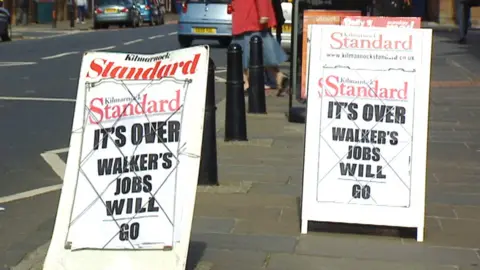
But Diageo is in talks - with a more modest budget - to help those who want to mark the 200th anniversary, next year, of John Walker corking his first bottle.
The company says that 707 people were employed at the Johnnie Walker plant in Kilmarnock when the closure announcement was made. Of those, 194 continued to work with the company after the plant closed. Some 431 took voluntary redundancy packages.
This process was eased by offering voluntary redundancy terms to older workers at other plants, creating space for those from Kilmarnock. Some moved home from Ayrshire to Fife, to work at Leven.
A much larger number went to work at Shieldhall. But anecdotal evidence suggests that it didn't work as well as hoped. The early and late shifts fitted poorly with a commute of up to an hour, for which public transport wasn't much help.

Kevan Knox had to apply for a similar job to the one he was losing at the Hill Street plant, and spent three years being uncertain if that was going to be permanent. His wife Elaine commuted to the Glasgow plant for four months, before giving up. It didn't fit with family life.
"It was a period of uncertainty," recalls Kevan. "Folk make you promises, but you need to know if you're actually getting a job. So we went through huge stress at that stage."
Ronnie Rankin was in logistics, and moved to Shieldhall, until Diageo handed the logistics operation to a contractor.
He now works, along with Kevan Knox, in a similar role at the expanding whisky production operation being run by Loch Lomond Group in Catrine, East Ayrshire.
'It was degrading'
Alex Rae recalls: "After 35 years (working), I had to go to the job centre. I'd never been there before. And that's daunting in itself, just to get through the doors.
"I lasted a month, and didn't go back, just trying to go and get something. It was degrading. You see some sights in there. Sometimes you get tarred with the same brush.
"Some (of the staff) are very nice. Some don't even look up. It's just 'sign that and away you go'. I'd meet people there and you'd blether and sometimes you'd hear there's a job going here or there, but we were all after the same jobs, and they were never full-time."
It has only been in the past year that Alex Rae has joined his friends in having a full-time and permanent job with Loch Lomond distillers.
Says Kevan Knox: "There are people we know who didn't get a job and, basically, their whole lifestyle changed. I know of certain folk who don't come out their house any more. They've not been able to find a job, and their whole life spiralled downwards.
"To be fair to the company, they tried to job-match people, but some couldn't go because of transport or commitments at home."
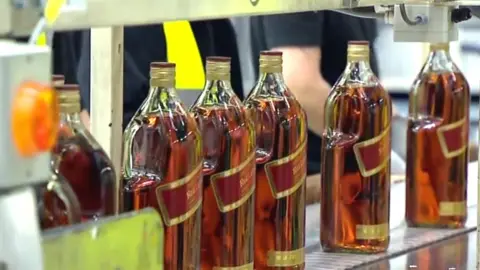
Other companies had to change radically when the supply chain to Kilmarnock fell away. In 2009, one unofficial media spokesman for the area was Marco Sinforiani, whose family has long run a newsagent close to the plant.
With lower footfall, there was a sense of doom back then. But the shop remains open, having diversified into specialist drinks, notably gins, and specialist pasta. There is footfall from college students.
Alex Milligan was chief reporter at the Kilmarnock Standard newspaper, having joined it in 1971.
To him, the Johnnie Walker closure was the final blow in a series of closures on which he had reported. Listening to him, it's striking how diverse the Kilmarnock manufacturing base had been, but it now reads like a roll-call of closures: Saxone shoes, Massey Ferguson combine harvesters, Glenfield and Kennedy water valves and fittings.
A railway carriage refurbishing yard remains busy, under the Wabtec firm.
Town's identity
Diageo's departure was worse than the others, says the veteran journalist - by being so big, the last of the big manufacturing employers, and being so much part of the town's identity.
"It all started here in a grocer's shop and mushroomed into a major force all around the world. For the company to shut up shop and say 'we're off - cheers', betrayal is probably a word that sums it up."
Kevan Knox has less harsh feelings: "I feel let down. I wanted to be with Diageo for life, and that's not happened. Personally, it's cost us. My wife and I didn't get the pensions we wanted. I wanted to see the 40 years out, and was three years out from that. But it gave us a good life."
Alex Rae concurs. "You've got to let bygones be bygones. One door closes, and another opens".
